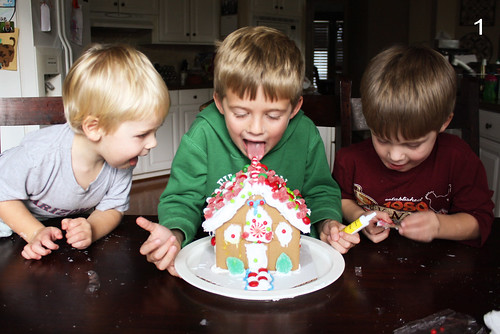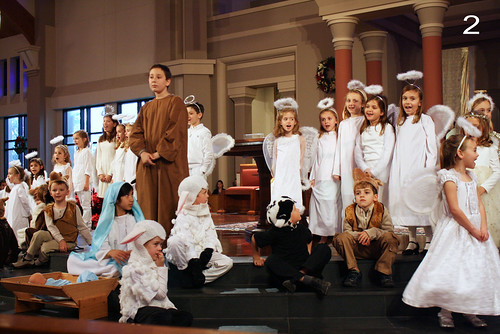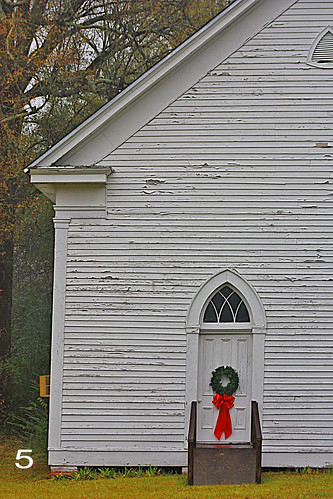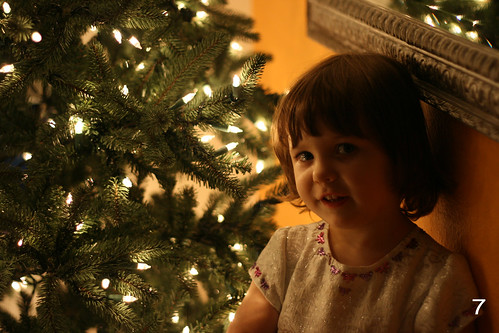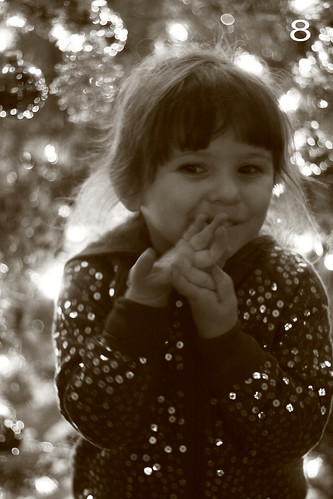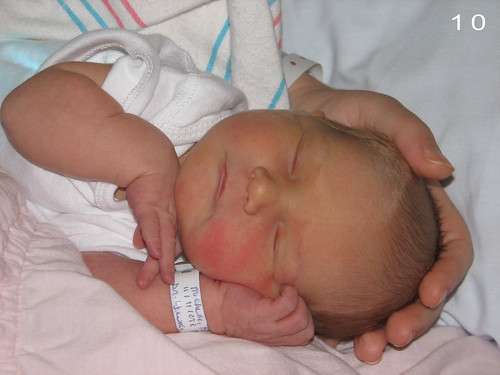- All I want for Christmas is a New Camera - LIVE at 11/30 8pm
- Creative Camera Modes - LIVE at 12/8 8pm
- Archival Coffee Table Class - LIVE at 12/12 8pm
- Digital File Management - LIVE at 12/14 8pm
Sunday, November 28, 2010
December's Training Schedule has been posted! - Photography Training
Thursday, November 18, 2010
Holiday Portraits Archive is Live - Photography Training
Tuesday, November 9, 2010
November's Training is Now Posted!- Online Photography Training
- Holiday Portraits (LIVE on 11/17)
- Holiday Cards (design, development and printing) (LIVE on 11/22)
- All I want for Christmas is a new camera (camera suggestions for every budget)(LIVE on 11/30)
Wednesday, October 20, 2010
Halloween Webcasts are Back! - Photography Training
Halloween is coming soon! Are you ready to take those story telling photos? Super cute up close photos or even just a photo that all of the kids are crying?
Come attend my LIVE webcast on So Scary, It’s Spooky Halloween informational session. It will give you all kinds of information on the upcoming holiday that you need. Topics to be discussed will be:
- -Tips and Tricks of Halloween photography
- -Jack O’Lantern photography
- -Ghosts, Goblins and Grownups
- -Trick and Treating
- -The Aftermath
- -Examples of Fall and Pumpkins
These webcasts will be very interactive sessions with a lot of discussion between attendees. These two LIVE sessions are free sessions. The archive session will be posted later for a small fee.
October 27th at 11:30am
October 28th 8pm
We will have a lot of fun, as we did this last year and a lot of my mom’s requested that we do this again. So here we go! So signup on this link. I will see you at one of these LIVE sessions or you can download the archive next week.
Happy Halloween!
Tuesday, July 13, 2010
50/50/50 is coming soon! - Woodlands TX Family Photographer
The Fstop site will be transformed into all things 50! I'm taking on a huge project called 50x50x50.
Where I will be visiting 50 parks around the Woodlands in 50 days. So for 50 days on the blog you will get to "visit" 50 parks around the Woodlands without leaving your living room, you will find more information right here on the blog and website. This is a great way to "visit" all of the parks in the Woodlands without having to actually go to all of them yourself.
What will happen:
I choose the park, (a different location everyday). If you would like your family showcased in one of these park settings, I have started posting the schedule on the calendar and you can book your session for a much discounted fee ($50). I start these August 21st! You just have to be adventurous, as we will be exploring the park together. And the great part is, I will be posting an 8x10 image of that session on the blog for sale for $50 (you will get this 8x10 for FREE). Hence the 50/50/50. At the end of the 50x3, I will put together a Woodlands coffee table book with all 50 images and make that book available to all, for you guessed it! $50. Sounds exciting huh?
When?
So want to know the schedule, click here to go directly there. We start August 21st, so make sure you are in August! I will be at a different park everyday. Fridays are "You choose" days, where you can dictate which park I will explore. I can't wait to see all of the beautiful parks. Most of these sessions will be done at sunset, due to the heat.
So check back here often to see the fantastic park "Previews" so you can see which park to take your kiddos to next!
Thursday, March 11, 2010
Wednesday Word of the day! - Photography Associations
These are a few that I am a part of, but there are a ton out there. I encourage all of you that are interested in photography to go out and look for yourself. You will learn so much. Learning is such a fantastic part of life. Of course, being a teacher by trade, you know that I enjoy being a lifelong learner, I will always be attending classes and conferences. But know that some of you might not enjoy that. Good news! It is not all about that. Some of these organizations have forums, events, magazines, etc. Some you just pay the annual fee and you are a member.
Professional Photographers Association (PPA) and local chapters - http://www.ppa.com/
PPA is one of the most well know Photography associations. It has so much information, and coverage in the annual fee you will be impressed. I highly suggest if you can only afford one, this is the one you get.
Wedding and Portrait Photographers International (WPPI) - http://www.wppionline.com/Default.aspx
This is the conference I just went to, but it is also an association. I will be posting more on this soon, but wow! Very impressive. If you are at all interested in weddings or portraits. Check this out.
Texas Photo Forum - http://www.texasphotoforum.com/forum/ - A good place to ask questions and it is free!
National Association of Professional Child Photographers (NAPCP) - http://napcp.com/photographers/
A great location for parents to look for a quality children’s photographer and for children’s photographers to advertise and learn. I am a member here, because of the discounts, blogroll and advertising.
Others
Texas Professional Photographers Association (TPPA) - http://www.tppa.org/pageone.htm
Professional Photographers Guild of Houston (PPGH) - http://www.ppgh.org/index.php
Friday, March 5, 2010
Upcoming classes!
I will be in Vegas for WPPI, but I will still be holding the Photo Crafts webinar on Monday at 7pm. There is still plenty of time for you to go and register.
www.woodlandsfstop.com
I hope to see you guys online and I will give you an update on what I'm learning straight from Vegas too.
Also, I am in the process of adding so new fun classes to the site! Things like Photo ABC books, How to turn your Photos into Coloring Pages and Photo Jewelry.
So go check it out. March and April are going to be busy!
Kara
Wednesday, March 3, 2010
Wednesday Word of the day! - Filters
If you don't have a filter on your lenses, drop everything you are doing right now and get one. These will save your lenses! For only the fact that they are protecting your lenses, that is huge. But there are also all kinds of cool filters that do really cool effects. So lets talk.
| Filter Type | Primary Use | Common Subject Matter |
|---|---|---|
| Linear & Circular Polarizers | Reduce Glare Improve Saturation | Sky / Water / Foliage in Landscape Photography |
| Neutral Density (ND) | Extend Exposure Time | Waterfalls, Rivers under bright light |
| Graduated Neutral Density (GND) | Control Strong Light Gradients Reduce Vignetting | Dramatically Lit Landscapes |
| UV / Haze | Improve Clarity with Film Provide Lens Protection | Any |
| Warming / Cooling | Change White Balance | Landscapes, Underwater, Special Lighting |
I currently have UV filters on all of my lenses for everyday use. It is mainly for protection from dirt, fingerprints, etc. When I purchase a new lens, I purchase the filter to go with it. In my opinion it is well worth the $15.
I buy screw-on filters, which you buy in the size of lens diameter. Just turn your lens to face you and there will be a # on the rim. Probably something like 50mm. With this option, the filter will only work for this specific lens. There is also an option of front filters, which you have to hold infront of the lens when you shoot. I do not find this as convenient.
I plan on buying some play filters for my bag in the future like warming, cooling and linear but just haven't gotten there yet.
If you would like more information on these. There is a great article online at this link.
http://www.cambridgeincolour.com/tutorials/camera-lens-filters.htm
Thursday, February 25, 2010
Click'n Moms
Click'n Moms is a fabulous forum that will help you not only learn your camera but also be comfortable taking photos and discussing your work. I highly recommend it. Click on the icon below to learn more information about it.
Enjoy!

Wednesday Word of the day! JPEG vs. RAW
Since we talked a little about the different coloration you can do to photos last week, let's talk about image compression this week. As long as you haven't been living under a rock for the last couple of years you have probably heard of JPG or GIFs.
JPEGS - Joint Photographic Experts Group. This is the name of the committee that designed the standard image compression algorithm. JPEG was designed for compressing full color or grey scale digital images of natural scenes. It doesn't work so well with non-realistic images, such as cartoons however. JPEG does not handle the compression of black and white (1 bit-per-pixel) images or moving pictures.
The other choice often used is GIF. A graphic file format mainly used for Web graphic or small animated (GIF) files. Not good for photographs as it only contains a maximum of 256 colours.
Most cameras output directly to JPEG or RAW format. RAW files store the unprocessed image data at 12 bits per channel. Directly from the camera's imaging chip to its memory storage device. RAW image files must be processed with special software before they can be viewed or printed. These are normally in the form of a plug in for Photoshop or as a standalone product. . The advantage is that you have the ability to alter the white balance, exposure value, colour values, contrast, brightness and sharpness as you see fit before you convert this data into the standard JPEG or TIFF format. Professional digital photographers import RAW image data directly into photo-editing programs like Photoshop CS (which comes with a Camera Raw plug-in that works with most popular RAW formats.)
If you are serious about your photography, I would suggest shooting in RAW, it gives you so much more freedom and flexibility. Yes, it takes up more hard drive space, but hard drives are cheap! Especially when that perfect shot is just slightly off and you need to tweak something. RAW will save you most every time.
Thursday, February 18, 2010
Wednesday Word of the day! - Sepia
What is sepia?
Sepia. The (brownish) mono toned effect seen in images from the original 19th and early 20th Century cameras. This is now a special feature often found as a special image effect on some digicams and/or editing software. A lot of professional photographers offer tinted photographs, like sepia.
Sepia is similar to the black and white effect. Some of the higher end cameras can do this effect in camera. Look around in your menu.
Wednesday, February 3, 2010
Wednesday Word of the day! - Megapixels
How important are all those megapixels?
What are megapixels anyway? Digital cameras capture photographs on image sensors, rather than on film (ahh, the old days!).The megapixel count is how many individual ‘dots’ are there on that image sensor, making up the photograph. 3 Megapixel cameras have 3 million dots on their sensors. 4 Megapixel cameras have 4 million dots . . . and so on.
You might assume then, that those extra million pixels will improve your digital photography. Not by much it won’t!I’ve shown the relative difference in size between image sensors below. The difference between a 3 and 4 megapixel camera isn’t all that much at all.
![]()
Other things to consider about the number of megapixels
Right, now we’ve got an understanding of pixels and sensor size, there are two things you should consider when making your digital camera comparison:- How important is picture quality to you?
- How will you view your photographs, computer screen or print?
This is determined by more than just the number of pixels. In fact, some cameras with a lot of megapixels produce worse pictures than cameras with fewer. The reason is twofold:
First, the more pixels crammed onto an image sensor, the smaller each individual pixel must be. The pixels are so small it’s difficult to accurately record the light hitting them. The results are what we call in digital photography ‘noise’ and ‘purple fringing’. (NB: Noise is a grainy effect to photographs, purple fringing is when light areas of the photograph bleed into the dark areas.)
Second, the quality of lenses. The best sensor in the world will be useless without a good lens to focus light onto it. At the same time, a lesser sensor, but with a good lens in front of it is capable of taking very good photographs.
How will you view your photographs?:
If you plan to use digital photography to take photographs that you will only ever view on screen, then you won’t need many pixels. A standard 15” monitor will be 1024 pixels wide, and 768 pixels high. The total is only 0.8 Megapixels. No point buying a 6 megapixel camera if you only need 0.8 of them!
Maybe someday you'll want to print them out
One day you may well decide to print the results of your digital photography. Most people do at some point, and therefore you’ll need to think carefully about the number of pixels when making your digital camera comparison.
The holy grail for printing is a resolution of 300 dots per inch. You will still get a good print from around 240 dots per inch though.
What does this mean for you in terms of megapixels? Have a look at the table below which shows how big a print you can realistically make:
| Megapixels: (MP) | Quality prints up to this size: |
|---|---|
| minimum of 2MP | 6” x 4” |
| minimum of 3MP | 7” x 5” |
| minimum of 6MP | 10” x 8” |
| minimum of 8MP | 12” x 10” |
Tuesday, January 26, 2010
Wednesday Word of the day! ISO
What is ISO? ISO measures the sensitivity of the image sensor, the lower the number the less sensitive your camera is to light and the finer the grain and vice versa. Lower # = less noise.
Depending on your camera’s make and model will play a HUGE roll in how high you can go and still remain “safe”. When I started out with my Canon Digital Rebel, I couldn’t even think about going over 400ISO without grain. My 50D worked well up to about 800ISO.
Play with your camera and find your “max”.
There are of course instances when you will have no choice but to go above what you are happy with. Indoor sporting events, a wedding perhaps, maybe even a dim clients home.
Because ISO is part of the triangle of light, changing your ISO greatly effects the two other key points, as will adjusting any or all of the points Aperture, Shutter Speed, and ISO.
Let’s setup a mental situation with poor light. Your local high school has asked you to shoot the Championship Basketball game Friday night. You know that the lighting is pretty poor and there is going to be a ton of quick moving action. Let’s determine which point of the triangle will be most important to us. I’m going to go with shutter speed. We are not going to want Jim Three Pointers to be blurry as he take that game winning shot. We want to capture that moment in time. Let’s bump the shutter speed to 1/500, maybe even 1/1000. You haven’t touched your aperture yet, it’s set at f/7 and your ISO is at 100 (haven’t touch that yet either). Shoot. WAY to underexposed. Remember that we want to leave ISO as our last ditch ever, so lets bump the Aperture down a whole lot. We can take that down to f/4 or even f/2.8 Wow! What a difference. MUCH more light coming in to the camera but still not perfectly exposed. Last resort, ISO…bump the ISO from 100 to 400. HUGE difference. Now shoot away!!
If you are in a low light situation that does not require a super fast shutter speed, get yourself a tripod! I know, its yet ANOTHER piece of equipment that you just don’t feel like lugging around, but you will be so thankful you did! Situation: Maternity session, clients home little light coming through the small itty bitty windows on a dark, stormy day. That small bit of light is hitting mom’s belly just right. Camera settings: Shutter Speed: 1/125 Aperture: f2.8 ISO: 200. You need just a bit more light coming into your camera. First thought, bump the ISO to 400 or higher, say a prayer and hope for no noise. IF you had your trusty tripod, you could easily break the hand held shutter speed rule (remember never put your shutter speed less than your aperture length or you risk some nasty shake blur). Hook that bad boy up to your tripod and you can drop the shutter speed down to 1/30 without any shake (as long as mom-to-be is a good listener and can sit still) ISO remains at a safe no-noise level.
The only way to get the hang of these tips and tricks is to get out the camera and play. Eat, Sleep, Breathe the triangle. When you get on location, take a big deep breath, review your surroundings, set your camera settings, check your settings, check ‘em again and start shooting, making adjustments as you go.
Aperture, Shutter Speed ISO. Aperture, Shutter Speed, ISO. Just keep saying it, out loud if you have to. You’ll be shooting manual in no time…with PERFECT exposure!
Taken from PropInsanity
Thursday, January 21, 2010
iPhone Contest! - Woodlands fStop
So get out there and shoot! You have until Feb 1. I will come up with some small gift for the winner. But in the mean time, I want to see some new participants. Get your friends involved, or maybe even your hubby. When you have your favorite one or two, send them to me. Hey, if you get two friends to send them in, let me know and I will give you your next webinar FREE.
And please, no shooting while driving. That is just bad safety.
Here is a funny one from Caden. That is a cereal puff in his nose. :)

Wednesday, January 20, 2010
Wednesday Word of the day! - Shutter Speed
Most think of needing to know about shutter speed when taking photos of action. If you are just starting out, the mode with the man running is tweaking your shutter speed, it is called the Action Mode. When taking a photo of a moving subject, changing the shutter speed can change the look of an image and help the look of the photo.
Using a fast shutter speed, tiny fraction, will freeze the action (1/1000). If a slow shutter speed, big fraction, is selected, movement is captured (1/2).
Here are suggested shutter speeds for photographing a variety of subjects.
| SUGGESTED SHUTTER SPEEDS | |
|---|---|
| TO FREEZE ACTION* | TO CAPTURE MOTION** |
| Children - 1/250 - 1/1000 seconds | Amusement park rides: +/- one second |
| Moving water/waterfalls: 1/1000 seconds or more | Moving water/waterfalls: 4 or more seconds |
| Sporting event: 1/500 - 1/2000 seconds | Fireworks: 1/2 - 4 seconds |
| Birds in flight: 1/1000th a second and above | Moving cars at night: 8-10 seconds |
| Night photography - one or more seconds | |
* The closer action is to your digital camera, the faster the shutter speed is needed.
To help prevent images from becoming blurred, set the shutter speed faster than the focal length. For example, a zoom lens set at 200mm requires a shutter speed of at least 1/200 second to avoid a blurred image.
** Tripod or other camera support is recommended whenever using slow shutter speeds. Also use the self-timer or remote to trigger the shutter to prevent camera movement.
Tuesday, January 19, 2010
Holiday Contest Winner - Woodlands fStop Contest
Thursday, January 14, 2010
Wednesday Word of the day! Aperture
Aperture is measured and set in F-stops. When you purchased a lens you probably thought what the heck does the 1.8 in the Canon EF 50mm 1.8 description mean? That is your MAX aperture. Now I told you this was confusing, and you might be saying MAX aperture, MAX means BIG, that doesn’t sound like the MAX, that's like the lowest number ever! Remember all of the fStop stuff from last week?
1. Keep your subjects on the same plane. Your Depth Of Field will vary greatly based on how close or far your subject is to the background and/or other subjects in the photo. Keeping your subjects on the same plane, gives you a better chance of getting multiple subjects in your focus area with little numbers. Especially with a MAX aperture, you are more likely to get someone out of focus unless everyone is sitting next to each other.
Helpful Tip: Change your Aperture number to match the number of subjects in your photo. 1 person, have at it and play with everything you’ve got. 3 people (try to keep them on the same plane!), start out at f/3.2, 5 people, f/5.0 and so on. This little tip can help you keep all your subjects in focus while still playing with your DOF.
2. Changing your Aperture effects light.
When you make changes to your aperture, you will need to compensate with changes to your shutter speed and or ISO. You will hear many people say, “I love that lens for low-light situations”. Those lenses have little numbers as their MAX aperture, which means…all together now, more light gets in there and these lenses let you keep lower ISO’s and faster shutter speeds in low conditions because the MAX aperture compensates for some additional light.
3. Every lens has a sweet spot. Although I like small #s for creamy backgrounds, I found that each of my lenses has an aperture setting that just, well ROCKS! Example…my 50mm 1.4 stops down to a MAX aperture of 1.4. When I put that bad boy on my camera I thought, I will never shoot with a “bigger” number, I am sticking with 1.4 all the way. We’ll I prefer my eyes sharp as tacks! So I practiced and played and then it happened. I shot a session at f/2.8 and I haven’t gone back since!
Go play! Share some tips an tricks!
Information taken from Prop Insanity
Tuesday, January 12, 2010
What the Holiday's Mean to Me Contest - Vote!
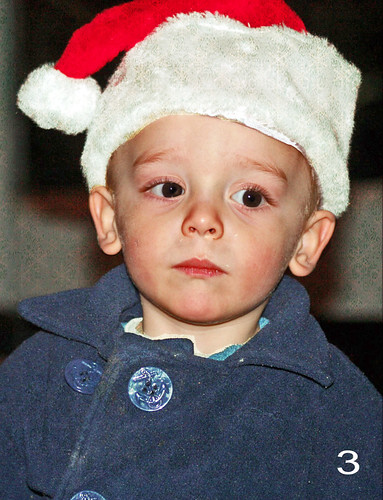
Sunday, January 10, 2010
Caden turns 1!
Tuesday, January 5, 2010
Wednesday Word of the day!
So what better word to start with, than the word that started it all.
fStop.
Aperture or what is sometimes called fStop is one of the more confusing parts of how cameras work, so let's make it easy.
| Aperture settings are expressed as decimal numbers, and works opposite to the way you’d think – a higher number lets in less light than a lower number. In between it is what is known as the f-stops, or aperture settings – numbers like f1.6, f2.2, f8.0, f16.0, with many in between. Different lenses can |  |
Changes to aperture will effect depth of field, which is why most people want to learn it first. Do you want your background to be blurry and the person to be in focus? This is depth of field. The smaller the fStop, the more blurry the background.
So if you have a really expensive lens (f/1.4) and you shoot your child in front of some trees, he or she will be in focus and the trees will be really blurry. Most likely some of their face will be out of focus as well, since it is such a high aperture.
Friday, January 1, 2010
Happy 2010!


